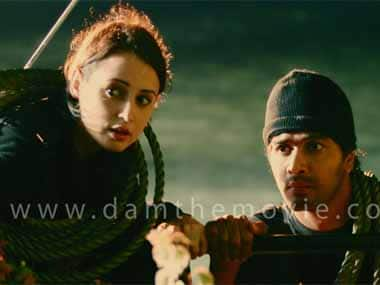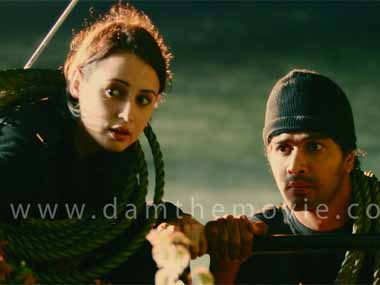by Justin Thomas Panachakel Sohan Roy’s Dam 999 is perhaps the first Indian film to really embrace the trope of alternate universes to illustrate in relief a social issue. Setting this film in an alternate 2009, the director expertly draws our attention to: 1. How mariners can create utopias; 2. How there has been scant research on number 9 since the Beatles’ White Album; 3. How Ayurveda is really magic; 4. How unbridled sexuality can have explosive consequences; 5. How white rajahs are a good idea; 6. How it is always the Tamil guy who destroys the Kerala idyll; Oh and there was also was something about a dam. Dam 999 starts at Marine City - architecturally inspired by Manipal University ads - where Capt. Freddie Brown is launching a book, titled DAM 999, that recounts the horrors of a dam-burst in Kerala. Receiving the first copies of the book are the love his life, Pakistani mariner Raziya, and the hero proper - mariner Vinay. Plod through the captain’s quips and flashbacks - and we are, I suppose, in the book. Viewer be warned, the frequency and abruptness of flashbacks can be quite unsettling, though musical cues can give you some indication that one is just around the corner. [caption id=“attachment_141145” align=“alignleft” width=“380” caption=“From the official website of Dam 999”]
 [/caption] Mariner Vinay is homeward-bound to Kerala hoping that his father, an Ayurvedic physician, can cure his young son Sam’s diabetes. He also hopes to reconnect with his childhood sweetheart, Meera who could be also (once his divorce is finalized), a replacement mum for his son. Capt. Brown also has deep ties to this part of Kerala - his great-grandfather constructed the original dam in the area, his father was apparently assassinated by anti-dam protesters, and his invalid sister is married to the current - evil - mayor who swept the elections riding the post-assassination sympathy wave. Much gobbeledygooking on the number 9 (nine planets, nine rasas, nine forms of love, nine inch nails) ensues, as do demonstrations of Ayurveda magic that can cure diabetes, snake-bites, infertility and paralysis. The villain does evil dam-related things and demonstrates his amazing cobra-wrangling and billiards skills. The nearly-divorced, documentary film-maker wife of the hero surfaces and the jealousy of planets regarding a Meera-Vinay relationship is expounded on - horrible tragedies have so far interrupted all amorous advances. A Rambo-style rescue mission is mounted and a couple of pirate themed parties later the deal is sealed by the planet-crossed lovers, causing the dam, in a Zizekian moment, to leak and finally burst. At the end of it all the viewer is not any wiser regarding why the dam is being opposed or what went wrong - the anti-dam protesters get 10 seconds of slogan-shouting screen time. We also don’t know how a British or Anglo-Indian (accounts vary on this) family managed to be hereditary mayors of a Kerala nook, wielding the combined powers of Pranab Mukherjee, Jairam Ramesh and Montek Singh Ahluvalia. With a little googling though, the whole mariner mystery is solved - the director is a seaman himself. Perhaps the most depressing aspect of the movie is Rajit Kapoor’s formerly-Kaliripayattu-now-Yoga, Ayurvedic physician. It is near devastating for those familiar with the understated elegance of his performance in Agnisakshi, which won him the Best Actor award in the Kerala State Film Awards some ten years ago. Vimala Raman as the maudlin Meera just waits around for the inevitable wet/towel scenes. Ashish Vidyarthi’s spirited evil, b-grade villain act - he does that in every Malayalam film he appears - would have been the saving grace of this film but for the extremely tasteless move to have just that one Tamil character. Every other character, every single one, just hams. The movie was either edited on power-point - to borrow a friend’s description - or it is an attempt at a novel cutting technique that (somehow) heightens the tension with odd-pacing, frequent flashbacks and the complete absence of any tense moments. The photography is insipid. Ajayan Vincent should have at least taken some cues from Santhosh Sivan’s Before the Rains, that other Kerala “hollywood” film of recent memory, which, while equally atrocious, worked as excellent scenery porn once you pressed mute. It is beyond me why this fever-dream of a seaman is even a film, no script-doctor or hollywood distributor could save his flawed vision. The film neither helps any side of the dam controversy nor does it provide any insight into that burning issue. That the needless controversy and film-banning charade could have only helped this film reach more viewers is something the Tamil Nadu government should be ashamed of. Mother always tells me to count my blessings, so I’m glad that at least I wasn’t subjected to this in 3D. Justin Thomas Panachakel is a film critic based in Thiruvananthapuram.
[/caption] Mariner Vinay is homeward-bound to Kerala hoping that his father, an Ayurvedic physician, can cure his young son Sam’s diabetes. He also hopes to reconnect with his childhood sweetheart, Meera who could be also (once his divorce is finalized), a replacement mum for his son. Capt. Brown also has deep ties to this part of Kerala - his great-grandfather constructed the original dam in the area, his father was apparently assassinated by anti-dam protesters, and his invalid sister is married to the current - evil - mayor who swept the elections riding the post-assassination sympathy wave. Much gobbeledygooking on the number 9 (nine planets, nine rasas, nine forms of love, nine inch nails) ensues, as do demonstrations of Ayurveda magic that can cure diabetes, snake-bites, infertility and paralysis. The villain does evil dam-related things and demonstrates his amazing cobra-wrangling and billiards skills. The nearly-divorced, documentary film-maker wife of the hero surfaces and the jealousy of planets regarding a Meera-Vinay relationship is expounded on - horrible tragedies have so far interrupted all amorous advances. A Rambo-style rescue mission is mounted and a couple of pirate themed parties later the deal is sealed by the planet-crossed lovers, causing the dam, in a Zizekian moment, to leak and finally burst. At the end of it all the viewer is not any wiser regarding why the dam is being opposed or what went wrong - the anti-dam protesters get 10 seconds of slogan-shouting screen time. We also don’t know how a British or Anglo-Indian (accounts vary on this) family managed to be hereditary mayors of a Kerala nook, wielding the combined powers of Pranab Mukherjee, Jairam Ramesh and Montek Singh Ahluvalia. With a little googling though, the whole mariner mystery is solved - the director is a seaman himself. Perhaps the most depressing aspect of the movie is Rajit Kapoor’s formerly-Kaliripayattu-now-Yoga, Ayurvedic physician. It is near devastating for those familiar with the understated elegance of his performance in Agnisakshi, which won him the Best Actor award in the Kerala State Film Awards some ten years ago. Vimala Raman as the maudlin Meera just waits around for the inevitable wet/towel scenes. Ashish Vidyarthi’s spirited evil, b-grade villain act - he does that in every Malayalam film he appears - would have been the saving grace of this film but for the extremely tasteless move to have just that one Tamil character. Every other character, every single one, just hams. The movie was either edited on power-point - to borrow a friend’s description - or it is an attempt at a novel cutting technique that (somehow) heightens the tension with odd-pacing, frequent flashbacks and the complete absence of any tense moments. The photography is insipid. Ajayan Vincent should have at least taken some cues from Santhosh Sivan’s Before the Rains, that other Kerala “hollywood” film of recent memory, which, while equally atrocious, worked as excellent scenery porn once you pressed mute. It is beyond me why this fever-dream of a seaman is even a film, no script-doctor or hollywood distributor could save his flawed vision. The film neither helps any side of the dam controversy nor does it provide any insight into that burning issue. That the needless controversy and film-banning charade could have only helped this film reach more viewers is something the Tamil Nadu government should be ashamed of. Mother always tells me to count my blessings, so I’m glad that at least I wasn’t subjected to this in 3D. Justin Thomas Panachakel is a film critic based in Thiruvananthapuram.
Dam 999: A bizarre film that provides no insight into the dam controversy
FP Archives
• November 26, 2011, 23:16:17 IST
Concentrating on the magical properties of Ayurveda, a distastefully stereotypical Tamil villain, and the cosmic properties of the number 9, this movie has very little to actually do with the dam controversy that gave it so much publicity in the run up to its opening.
Advertisement
)